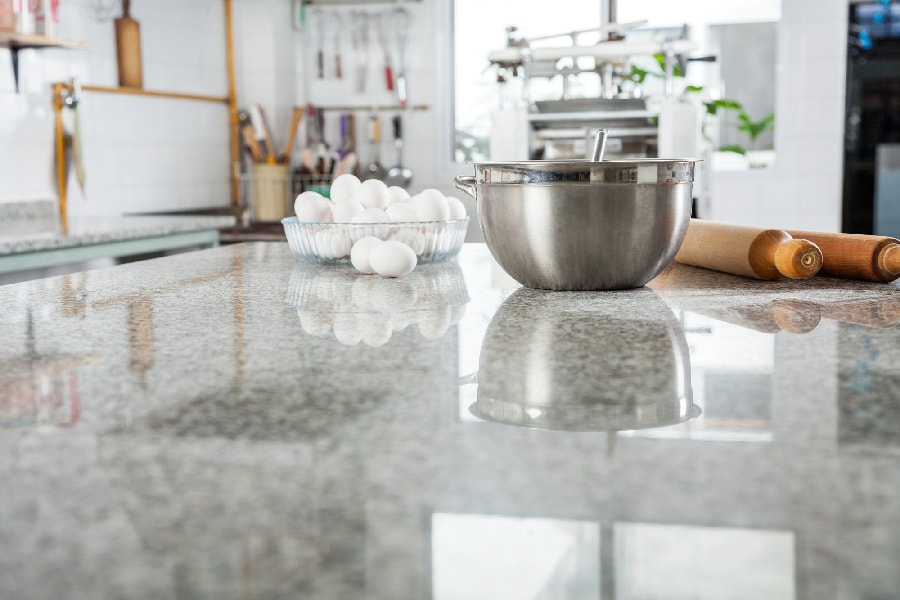Within construction and design, natural stones hold a special place as timeless and elegant materials for various applications. Granite, marble, and other natural stones are often seen adorning floors, countertops, walls, and even sculptures. Each type has its unique characteristics that make it suitable for different uses.
Understanding the differences between these luxurious materials can be crucial in making informed decisions when it comes to incorporating them into your projects. Below, we’ll detail the distinct qualities of granite, marble, and other natural stones to help you navigate their vast array of options with confidence.
Types of Natural Stones
Natural stones are highly regarded for their timeless beauty and elegance. Among the most popular types are granite and marble, both widely used in various applications such as flooring, countertops, walls, and sculptures.
Granite is a highly durable stone known for its strength and resistance to scratches and heat. With its distinct grains and speckled patterns in a wide range of colors, including black, gray, white, red or green shades; granite adds a touch of luxury to any space. It is suitable for high-traffic areas like kitchens because it can withstand heavy use without losing its luster.
Marble exudes classic beauty with its smooth veining patterns that flow through an array of shades from white to black to vibrant hues. However, compared to granite, marble is softer and more porous which makes it prone to stains and etching if not properly sealed or maintained. Despite this vulnerability, many still choose marble for its elegant appearance which works best in low-traffic areas such as bathrooms or decorative accents.
While granite and marble dominate the natural stone market due to their popularity among homeowners and designers; there are other noteworthy options worth considering too like quartzite with its striking appearance similar to marble but denser composition similar to granite making it highly resistant; limestone with soft earthy tones perfect for creating warm ambiance indoors or outdoors; or travertine famous for its unique textured surface ideal as cladding on facades or pool decks.
Physical Properties of These Stones
Granite, marble, and other natural stones all have different physical properties that make them unique. One key difference is their hardness. Granite is known for being one of the hardest natural stones, making it extremely durable and resistant to scratches and breakage. This makes granite a popular choice for high-traffic areas such as kitchen countertops. Marble, on the other hand, is softer and more porous than granite. While this can make it susceptible to stains and etching, it also means that marble can be easily carved and shaped into intricate designs.
Another important physical property of these stones is their appearance. Granite typically has a coarse-grained texture with a speckled or mottled pattern in various colors such as black, gray, white, or brown.
Marble has a smoother surface with distinctive veins running through it in shades of white, gray, blue or green. These unique patterns make each slab of granite or marble truly one-of-a-kind.
Choosing the Best Material for Your Project
When it comes to choosing the best material for your project, it is important to understand the differences between granite, marble, and other natural stones. Each type has its own unique characteristics that make it suitable for different uses.
Granite is known for its durability and strength, making it ideal for high-traffic areas such as kitchen countertops. It is resistant to heat and scratches, making it a practical choice for busy households.
Marble, on the other hand, is elegant and luxurious in appearance but more delicate compared to granite. It tends to be more prone to stains and scratches, so it may be better suited for areas with less foot traffic.
Other natural stones such as limestone and travertine also have their own distinct qualities. Limestone has a softer look than granite or marble and can give a more rustic feel when used in construction projects. Travertine has a unique texture with natural holes that add character to any space.
Choosing Granite Countertops in Vero Beach
Understanding the differences between granite, marble, and other natural stones is essential when considering their usage in construction and design projects. Each material possesses unique qualities that make it suitable for specific applications such as flooring, countertops, walls, or sculptures. By having a thorough understanding of these characteristics, professionals can make informed decisions that best suit their project’s requirements.
Granite stands out for its durability and resistance to heat and scratches. It is an ideal choice for kitchen countertops where high temperatures or sharp knives are involved. On the other hand, marble slabs in Vero Beach exhibit elegance with its intricate veining patterns and smooth finish. It is commonly used in bathrooms or as luxurious flooring options in living spaces.
Other types of natural stones also offer various advantages that cater to different needs. Limestone provides a soft and warm aesthetic while sandstone offers a rustic charm perfect for outdoor areas. Soapstone is loved for its heat-resistant properties which make it a popular choice for fireplaces or cooking surfaces.
Considering the distinct qualities of each natural stone will allow designers and builders to choose the most appropriate material based on aesthetics as well as functionality requirements. An informed decision leads to long-lasting beauty and satisfaction with your Vero Beach countertop installation.

